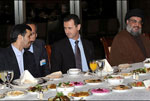 Reuters: Signs that President Bashar al-Assad is rapidly losing his grip on Syria alarm his regional allies, Iran and Hezbollah, and worry other neighbors fearful of chaos on their doorsteps. By Alistair Lyon
Reuters: Signs that President Bashar al-Assad is rapidly losing his grip on Syria alarm his regional allies, Iran and Hezbollah, and worry other neighbors fearful of chaos on their doorsteps. By Alistair Lyon
 LONDON (Reuters) – Signs that President Bashar al-Assad is rapidly losing his grip on Syria alarm his regional allies, Iran and Hezbollah, and worry other neighbors fearful of chaos on their doorsteps.
LONDON (Reuters) – Signs that President Bashar al-Assad is rapidly losing his grip on Syria alarm his regional allies, Iran and Hezbollah, and worry other neighbors fearful of chaos on their doorsteps.
This week’s sustained battles in the capital Damascus and the explosion that killed Assad’s feared brother-in-law and three other men at the core of his fight for survival have focused attention on the possible consequences of his downfall.
Strategically, Iran and Lebanon’s Shi’ite Hezbollah group – whose leader Hassan Nasrallah publicly mourned the slain Syrian officials as “comrades-in-arms” – have the most to lose, and their regional foe Saudi Arabia the most to gain.
Turkey, a friend of Assad until it fell out with him last year for rejecting its advice to defuse the uprising with real reform, will be happy to see him go, but is nervous about the uncertainties of any future struggle for power in Syria.
No mechanism for an orderly transition is in place. The bloodshed of the past 16 months has created many new scores to settle, particularly between Assad’s Shi’ite-linked Alawite minority and Syria’s 70 percent Sunni Muslim majority.
Any slide into sectarian warfare in Syria, which also has Druze and Christian minorities as well as ethnic Kurds, risks knock-on effects in neighbors such as Iraq and Lebanon with their own delicate and sometimes explosive communal mix.
Such a conflict could spill over Syria’s borders or suck in neighbors trying to defend their interests or co-religionists.
Turkey, Iraq, Jordan and Lebanon are jittery about refugees who might flood across their frontiers and the potential rise of radical Sunni Islamists in Syria, which Assad has long warned could become “another Afghanistan” without him.
Israel will be delighted at the damage Assad’s fall would do to Iran and Hezbollah, but must reckon that any future Syrian government will be just as attached to the Israeli-occupied Golan Heights, captured in the 1967 Middle East war.
Despite their hostility to Israel, Assad and his father before him kept peace on the border for nearly 40 years, prompting some Israelis to prefer them as the “devil you know”.
For now, Israel’s foremost bugbear is the fate of Syria’s chemical arsenal, although it is not clear whether Hezbollah or any other group could actually use the weapons, which require complex means of delivery, if they fell into their hands.
BETTING ON A LOSER?
Syria’s neighbors are all concerned about stability, but seem to lack any decisive influence on events in a country whose turmoil major world nations have also proved powerless to check.
The accelerating pace of events appears beyond even Syria’s allies Iran and Hezbollah, which have placed all their bets on an Assad dynasty that has endured for more than four decades.
Syria, the only Arab nation to back Iran in its 1980-88 war with Iraq, never let ideological differences with Tehran obstruct a common interest in nurturing Hezbollah.
Both countries valued the militant group, loyal to the Islamic revolution, first as a frontline force to resist Israeli occupation and Western intervention in Lebanon from the early 1980s, and then as a potent local ally in Lebanese politics.
Syria has supplied arms to Hezbollah and transferred Iranian weapons to the group, as Nasrallah himself said on Wednesday.
“Syria is a path for the resistance and a bridge of communication between the resistance and Iran,” he told a Beirut rally, saying Syria had sent the rockets used in Hezbollah’s 2006 war with Israel and had supplied Hamas in the Gaza Strip.
He did not mention that Hamas, a Sunni Islamist group, has turned against Assad and abandoned its offices in Damascus.
A hostile post-Assad Syria would deprive Hezbollah of its only land supply route and deny Iran its main access to the Mediterranean and the frontlines with Israel.
If a moderate Sunni-dominated government came to power in Damascus, that would also help tilt the regional balance of power in Saudi Arabia’s favor and strengthen the hand of Sunnis in nearby Lebanon, another challenge for Hezbollah.
With so much at stake, Iran has given Assad unwavering moral, if not practical, support, endorsing his line that terrorist proxies for Western and Arab powers are to blame for the uprising against him.
While Western leaders disavow any intent to intervene militarily in Syria, they have turned a blind eye as two U.S.-allied Arab autocracies, Saudi Arabia and Qatar, funnel money to Syrian rebels for weapons and other needs.
The “loss” of Syria, following Hamas’s defection, would also represent an ideological blow to Tehran’s “axis of resistance” to U.S.-Israeli designs stretching from Iran to Lebanon, as well as to Iran’s own image as standard-bearer of Islamic revolution.
Syria, so long a formidable player in regional power games, now finds itself an arena for wider conflicts: Saudi-Iranian rivalry, Sunni-Shi’ite tension and a contest pitting the West against Russia and China that has paralyzed the United Nations.
The gains of any outside “winners” in the struggle for Syria may prove transitory or consumed by unforeseen consequences.
The real losers are the Syrian people, who may gladly rid themselves of Assad, but whose agony may be far from over.
(Editing by Peter Graff)


